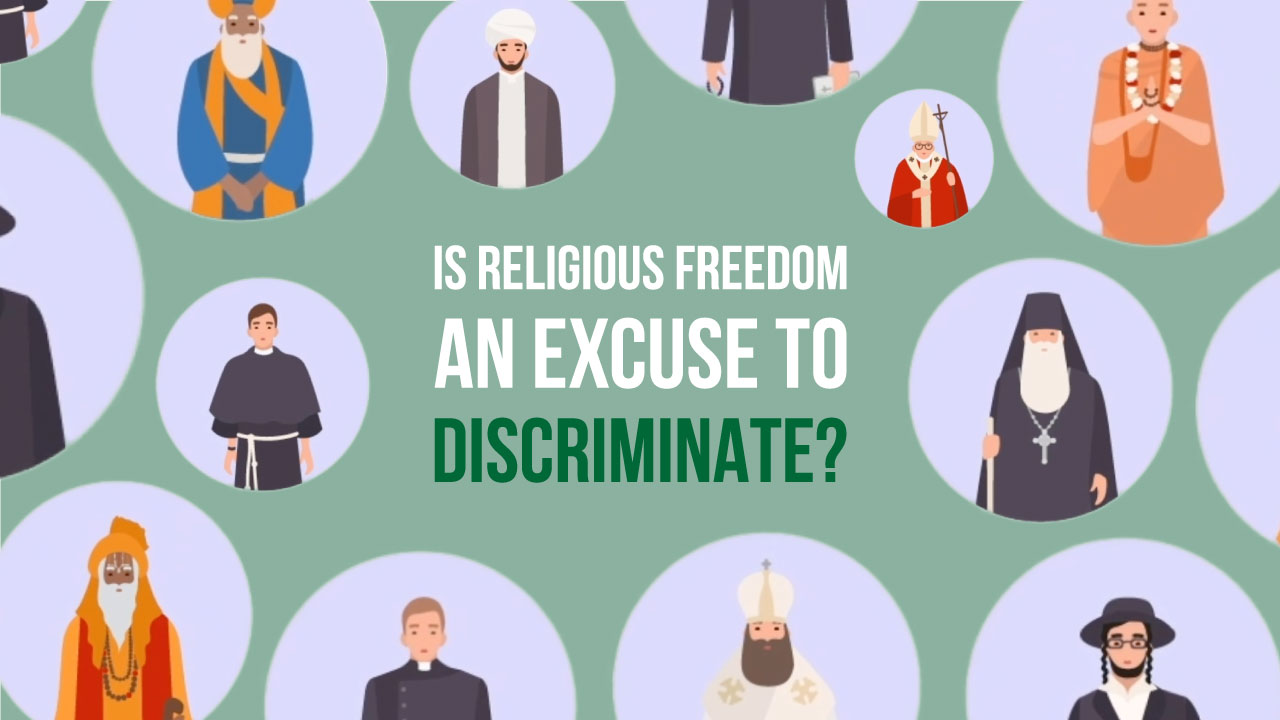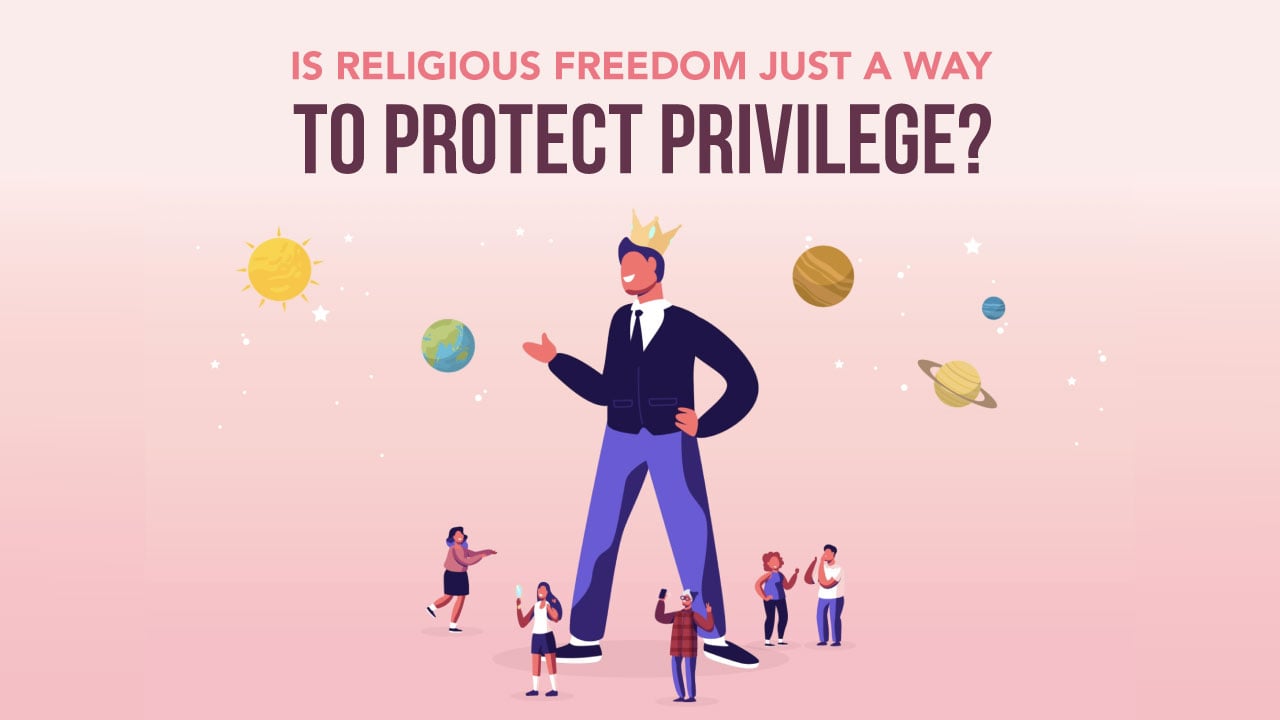You’re in a conversation and someone says, “Religious ‘freedom’ is bad because it gives cover for violent religious extremists.”
What would you say?
Some people think that religious liberty allows religious groups to do anything they want to do. So, extremist groups are able to use religious freedom as a license to hurt others. But does standing up for religious freedom mean enabling violent or dangerous groups?
Absolutely not. And here are three reasons why.
1. Religious freedom does not protect violent actions—even if they are religiously motivated.
2. Discomfort is not the same as violence.
3. Religious liberty actually makes societies safer for more people—not fewer.
Thanks to Alliance Defending Freedom for partnering in the creation of this video! You can learn more about ADF by visiting www.adflegal.org
Doesn’t Religious Liberty Protect Extremists Too? You’re in a conversation and someone says, “Religious ‘freedom’ is bad because it gives cover for violent religious extremists.” What would you say? Some people think that religious liberty allows religious groups to do anything they want to do. So, extremist groups are able to use religious freedom as a license to hurt others. But does standing up for religious freedom mean enabling violent or dangerous groups? Absolutely not. And here are three reasons why. Number 1: Religious freedom does not protect violent actions—even if they are religiously motivated. Religious freedom protects each person’s right to speak, act, and live according to their deeply held religious beliefs, peacefully and openly. It means that the government cannot unjustly punish you for holding, expressing, or peaceably acting on your religious views. However, religious freedom does not translate to a blank check for violence in the name of religion. A Judeo-Christian concern for religious liberty stems from a belief that every person is made in God’s image. That’s why Christians, Jews, and others who advocate for religious liberty also oppose human rights violations like sex trafficking, forced marriages, and physical abuse—whether or not these actions are motivated by religious beliefs. The right to live according to one’s conscience frees people of faith to work for the good of their neighbors—it’s not a free pass to excuse evil in the name of religious devotion. Number 2: Discomfort is not the same as violence. Just because somebody’s beliefs make another person feel uncomfortable does not mean those beliefs are dangerous. This is a crucial distinction that must be made to properly understand the scope of our rights. It is increasingly common—on public school and university campuses, and even in the workforce—to claim that someone expressing their views is harmful, hateful, or even violent. But that’s not true. Consider this situation: A religious student voices her Christian beliefs on marriage or sexuality in a classroom or in a professor-assigned essay. Some of her fellow students – and maybe even her professor – would almost certainly claim that her words make them uncomfortable. But is she harming anyone in any way? Of course not. She is simply expressing beliefs held in common for thousands of years with billions of people all over the world. She’s well within the limits of her freedom—even if her words and beliefs make others uncomfortable. Sure, not everyone agrees, but isn’t that what freedom is for—to test out competing ideas and see which one lines up with the truth? And who knows? Maybe hearing her explanation will encourage others to think more deeply about what’s best for individuals and for society. Encountering ideas or beliefs that make us uncomfortable is part of living in a pluralistic society. The alternative is forced conformity and cancel culture, where only one set of ideas is acceptable, and all others are punished and repressed. And that is definitely not freedom. Number 3: Religious freedom actually makes societies safer for more people—not fewer. The alternative to living freely according to your beliefs is a stifling conformity where the government and the powerful decide who can speak and what they can say. One version of that is cancel culture, which we’re seeing more and more of in the West. The other is outright totalitarianism. Nations that do not protect religious freedom and free speech also tend to violate other human rights. In Iran, for example, there is very little religious freedom. And under the Iranian regime, women have no legal protection against domestic violence and abuse from husbands, and they cannot request a divorce based on that abuse. If someone tries to convert from this oppressive form of Islam, he or she faces imprisonment and even death. Religious freedom guards against totalitarianism by protecting people’s rights to discuss and explore new ideas; live out their beliefs freely without fear of repercussions; and change their minds and their lives as they learn more about God. So the next time someone tells you that religious freedom leads to religious extremism, remember these three things: Number 1: Religious freedom does not protect violent actions—even if they are religiously motivated. Number 2: Discomfort is not the same as violence. Number 3: Religious liberty actually makes societies safer for more people—not fewer.
For more on marriage laws in Iran, see: https://www.law.cornell.edu/women-and-justice/resource/civil_code_of_iran_%28divorce_and_dissolution_of_marriage%29
For more on conversion laws in Iran, see: https://www.state.gov/reports/2020-report-on-international-religious-freedom/iran/
 Read More
Read More
 Read More
Read More


